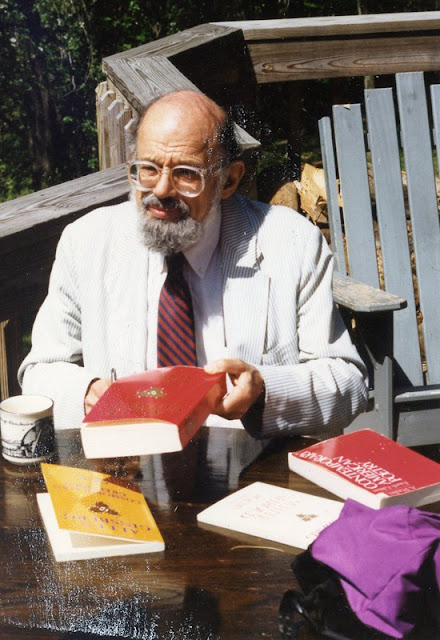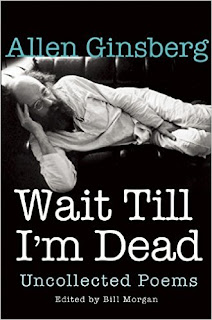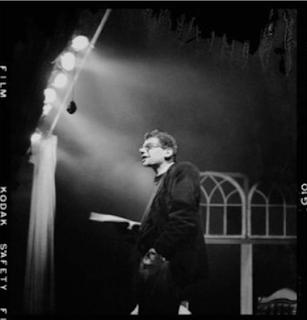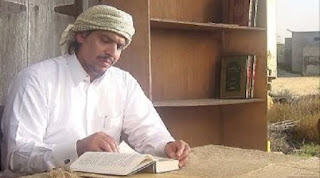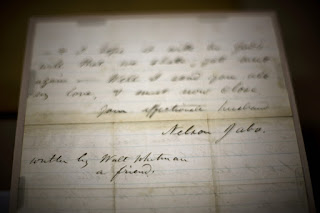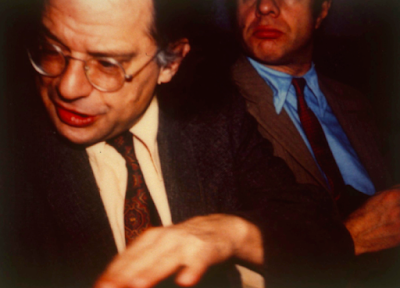[Jack Kerouac's original hand-drawn cover for On The Road]
[Jack Kerouac photographed by Allen Ginsberg - caption reads: "Jack Kerouac wandering along East 7th street after visiting Burroughs at our pad, passing statue of Congressman Samuel "Sunset" Cox, "The Letter-Carrier's Friend" in Tompkins Square toward corner of Avenue A, Lower East Side; he's making a Dostoyevsky mad-face or Russian basso be-bop Om, first walking around the neighborhood, then involved with The Subterraneans, pencils & notebook in wool shirt-pockets, Fall 1953, Manhattan."]
[Jack Kerouac photographed by Allen Ginsberg - caption reads: "Jack Kerouac wandering along East 7th street after visiting Burroughs at our pad, passing statue of Congressman Samuel "Sunset" Cox, "The Letter-Carrier's Friend" in Tompkins Square toward corner of Avenue A, Lower East Side; he's making a Dostoyevsky mad-face or Russian basso be-bop Om, first walking around the neighborhood, then involved with The Subterraneans, pencils & notebook in wool shirt-pockets, Fall 1953, Manhattan."]
Allen Ginsberg: I might as well supplement what Gregory said about the mussed hair and the crucifix with Kerouac’s own account of it . Some of you may know it, some not:
(JK): “That nutty picture of me on the cover of On The Road was the result of I’d just gotten down from a high mountain where I’d been for two months completely alone, and usually I was in the habit of combing my hair of course, because you have to get rides on the highway and all that and you usually want girls to look at you as though you were a man and not a wild beast. But my friend, Gregory Corso, opened his shirt and took out a silver crucifix that was hanging from a chain and said “Wear this, and wear it outside your shirt - and don’t comb your hair”, So I spent several days around San Francisco, going around with him and others like that, to parties, arties, parks, jam-sessions, bars, poetry-readings, churches, walking-talking poetry in the streets, walking-talking God in the streets, and at one point a strange gang of hoodlums got mad and said, “What right does he have to wear that?”, and my own gang of musicians and poets told them to "cool it", and finally, on the third day, Mademoiselle magazine wanted to take pictures of us all. So I posed just like that, wild hair, crucifix and all, with Gregory Corso, Allen Ginsberg, and Philip Whalen, and the only publication which later did not erase the crucifix from my breast, from that plaid sleeveless cotton shirt-front, was The New York Times, therefore the New York Times is as Beat as I am and I’m glad I’ve got a friend”
(JK): “That nutty picture of me on the cover of On The Road was the result of I’d just gotten down from a high mountain where I’d been for two months completely alone, and usually I was in the habit of combing my hair of course, because you have to get rides on the highway and all that and you usually want girls to look at you as though you were a man and not a wild beast. But my friend, Gregory Corso, opened his shirt and took out a silver crucifix that was hanging from a chain and said “Wear this, and wear it outside your shirt - and don’t comb your hair”, So I spent several days around San Francisco, going around with him and others like that, to parties, arties, parks, jam-sessions, bars, poetry-readings, churches, walking-talking poetry in the streets, walking-talking God in the streets, and at one point a strange gang of hoodlums got mad and said, “What right does he have to wear that?”, and my own gang of musicians and poets told them to "cool it", and finally, on the third day, Mademoiselle magazine wanted to take pictures of us all. So I posed just like that, wild hair, crucifix and all, with Gregory Corso, Allen Ginsberg, and Philip Whalen, and the only publication which later did not erase the crucifix from my breast, from that plaid sleeveless cotton shirt-front, was The New York Times, therefore the New York Times is as Beat as I am and I’m glad I’ve got a friend”
AG: Letters from Kerouac in 1954, when he was first beginning to absorb Buddhist texts and Buddhist ideas and ideas of meditation and transform them into his own personal vehicle. So some.. December 1954 writing from New York (I had written to him from Mexico about a dream that I’d had of seeing a hero on a cross, with very gorgeous Catholic-looking ceremonial drapes all around). He said, “wealth of drapesand dark lapped colors andRembrandt splendor can’t make up wealth of detail, les meubles, they can’t make up for the simple line of clarity as elicited by a near-naked Indian whose crown of glory far exceeds.. messianic hung-up maniacsof Rama [he’s talking about Christ there] -"..far exceeds.. messianic hung-up maniacsof Rama, and whose main ambition is always political and terrestrial, otherwise they’d be no reason for multitudes of pharisees to give them political crucifixtion. Jesus got in everybody's hair, face it!. Edgar Cayce is nothing but a Jesus Christ hillbilly who pretended to be ignorant of medicine, pretended to go into trances, was just apparently extremely intuitional and classic physician who however had a mystic streak and wanted to propheyize and so cooked up this bed trance medicine."
So that’s an early take. I can.. I accused Lucien (Carr) of being proud of suffering (which, incidentally, is what Neal (Cassady) is), because the only thing.. the only reason why I couldn’t make any impression on his intelligence with the doctors of the East was because he, being a life proud American like (William) Burroughs and Lucien, wouldn't accept the number one truth of Buddha – the first of the Four Great Truths – all life is sorrowful. Thinking that misery is grand ruptures their rapture, life is suffering, this you've got to understand. If you think it is anything but suffering you've lost completely the significance of even the need for emancipation. And of course for your beginning studies in Buddhism you must listen to me carefully and implicitly, as though I was (Albert) Einsteinteaching you relativity, or (T.S.) Eliot teaching the formulas of objective correlation on a blackboard in Princeton.
And so, then he prescribes a reading-list – from the Lamkavatara Sutra, to begin with. (This is for any of you who are interested in his entry into Buddhism or your own parallel inquisitiveness into that field) – the Buddhacarita, orLife of BuddhabyAsvaghosa (the patriarch, which is a book used popularly around Boulder, intcientally), Paul Caru’sGospel of Buddha (which is a more nineteenth-century shot), Buddhism in Translation by Henry Clarke Warren also in the Harvard Classics (and that was a text, those were texts used by T.S. Eliot previously), The Buddhist Bibleby Dwight Goddard (which was his main source – and he says of that –“This is by far he best book because it contains the Surangama Sutra and the Lankavatara Sutra scripture, not to mention the eleven-page Diamond Sutra, which is the last word. and Asvaghosa's Awakening of Faith andthe Tao.The Buddhist Bible uses sources from the Pali, Sanskrit, Tibetan, Chinese, Burmese, and modern, and from The Buddhist Bible he got Songs of Milarepa and a lot of talk about Marpa’s wife, Damema(Dakmema), (whose name constantly recurs in Mexico City Blues – Damema, mother of Buddhas, who he identified with his own mother.)
(The list continues withthe Digha Nikaya, (the dialogues of Buddha), and the Visuddhimagga by Buddhagosa, Paths of Purity..The Visuddhimagga is what?.. the exposition of..
(The list continues withthe Digha Nikaya, (the dialogues of Buddha), and the Visuddhimagga by Buddhagosa, Paths of Purity..The Visuddhimagga is what?.. the exposition of..
AG: Abhidhamma
OT: Purification, right.That’s the..AG: So that would be like a precision…precise instructions in how to eat , how to sit
OT: What happens in your mind when you sit
AG: Oh-ok
OT: All the little scientific detail(s)
AG: OK. So that’s the systematic scientific analysis of the psychology of consciousness while sitting – AndSacred Books and Early Literature of the East – “Now Allen, as Neal (or (Lucien) Carr) can tell you, last February I typed up a hundred-page account of Buddhism for you, gleaned from my notes, and you'll see proof of that in several allusions and appeals to (you). And I have that here, if you really want to see it, I'll send it importantly stamped. It's the only copy,we must take special care with it, right? Some of the Dharma I called it and it was intended for you to read in the jungle. Some of it is now, I see, useless because mistaken or written on grass or other faults, but it may really give you a send off into the above tomes, which is my wish. Listen, you must begin with the Life of Buddha by Ashvaghosa, then if you can read the Surangama Sutra next, this is how I found the path, but the paths of the many are many to the one path”
And - “I don’t have to write. I may write to teach. I suppose I gotta teach. but likeJoe McCarthy I'm getting awfully sick of being reprimanded for losing my hold on life's attaching apparatuses. It's like I commited some crime. Nirvana means, snapping a relationship, so naturally noone will like me any mo'. Close your eyes, cross your legs under you,practice slow in-breathing and out-breathing, think "I am breathing in, I am breathing out", then you think, "there is the breathing-in, there is the breathing-out", and soon essential mind will begin to shine in you and you will beginto experience your first
samadhi"
So that was his instructions to me and I immediately wrote him back and said, "Okay, you be my guru”. So he wrote me back a long letter saying, ”Well, I don’t know enough about it, I can’t be your guru. However, if you’ll listen to me, and do this and that, and read the Diamond Sutra..” But, my first reaction, actually (something I’ve mentioned before but it’s really interesting, because it might.. I think it’s something that relates..that (Ken) Kesey would understand - (and most of you would understand) - there is a resentment that I felt, instantly, at being told that existence is suffering, that life.. that theFirst Noble Truth that Kerouac talks about.. because as a high-school kid from New Jersey I was looking forward to a career, and getting on in life, and having a successful, happy,whatever, (as) either a career, or a marriage, or a house, or an American future, and then Kerouac was coming in and saying, “Existence is suffering”, and he did it with a slight edge of aggression there, which actually turned me off for the first couple of years, thinking that I was going to submit to some horrible doctrine from the East which would turn the Universe into an inhuman dog-eat-dog affair, not realizing that it was actually.. it’s sort of a neutral descriptive statement. The.. I found it easier to understand in terms that I’ve heard around here in Boulder, “Existence contains Suffering”, because that’s… obviously, or the statement, “being born in a body”, there’s a slight in.. – it’s not insecurity, it’s like..discomfort, having a body and having to sit in a body and the discomfort obviously of the body falling apart.
samadhi"
So that was his instructions to me and I immediately wrote him back and said, "Okay, you be my guru”. So he wrote me back a long letter saying, ”Well, I don’t know enough about it, I can’t be your guru. However, if you’ll listen to me, and do this and that, and read the Diamond Sutra..” But, my first reaction, actually (something I’ve mentioned before but it’s really interesting, because it might.. I think it’s something that relates..that (Ken) Kesey would understand - (and most of you would understand) - there is a resentment that I felt, instantly, at being told that existence is suffering, that life.. that theFirst Noble Truth that Kerouac talks about.. because as a high-school kid from New Jersey I was looking forward to a career, and getting on in life, and having a successful, happy,whatever, (as) either a career, or a marriage, or a house, or an American future, and then Kerouac was coming in and saying, “Existence is suffering”, and he did it with a slight edge of aggression there, which actually turned me off for the first couple of years, thinking that I was going to submit to some horrible doctrine from the East which would turn the Universe into an inhuman dog-eat-dog affair, not realizing that it was actually.. it’s sort of a neutral descriptive statement. The.. I found it easier to understand in terms that I’ve heard around here in Boulder, “Existence contains Suffering”, because that’s… obviously, or the statement, “being born in a body”, there’s a slight in.. – it’s not insecurity, it’s like..discomfort, having a body and having to sit in a body and the discomfort obviously of the body falling apart.
Well that was Jack’s first take on Buddhism. I hadn’t realized that apparently he had some idea of sitting, probably from reading. The difficulty was that there was no Zen master, meditation teacher, that we knew of , until Suzuki Roshi came in 1958 to San Francisco. I don’t think Jack met Suzuki Roshi. (In) the period of 1954-1955-(19)56, when we were all hanging around together with Philip Whalen and Gary Snyder (which totally turned him on to the texts – the Lamkavatara Sutra and Surangama Sutra that he was reading, with them). I don’t think Gary ever showed me how to sit, and Gary, I found out recently, he didn’t know either, except from books (because he hadn’t actually a sitting or meditation teacher – so Gary might have learned it from statues, actually, he said – statues and books – the postures. And so there was no transmission of exact, precise information on how to sit. And so Kerouac’s sitting, as it’s described in The Scripture of Golden Eternity is more like a force-feed fed fast instant squeezed tight-assedkundalinishot (holding your breath!) – at least at that point by the year he wrote The Scripture of Golden Eternity, at Snyder’s recommendation that he explain what he knew
Okay
Now [at approximately thirty-eight-and-a-hald ninutes in] John Clellon Holmes (speaks)
[John Clellon Holmes and Jack Kerouac]
[John Clellon Holmes and Jack Kerouac]
John Clellon Holmes:I’m here on this panel, I suppose, to read.. First, is, I was asked somemonths ago, after looking over the topics that would be taken up in this conference, if I had any suggestions, and I said I thought there should be a panel on Catholicism and Buddhism as they related to Jack Kerouac. I later discovered that I was to be a member of that panel, which is interesting because I am neither a Catholic nor a Buddhist. Knowing Jack as I did, and corresponding with him regularly over the twenty-two years that we were friends, it was inevitable that I would be a witness to his spiritual travels, which were continuous and endless. He was that way when I met him, he was that way when he died. He saw spirit in everything. He, at various times in my relationship with him, he explained it in terms related to, or borrowed from, various religions, primarily the oldest sort of Christianity, and later, what I took to be, and I has not been proved opposite since then, a profound and penetrating understanding of the Buddhist view of life, and of reality. As a man without a faith, then, but, I observed this because I could not feel that anything that this man was interested in was insignificant. I was an atheist when I met him. I studied religion primarily because I wanted to understand what he was talking about Catholicism was instinctive to him when I met him. He talked in terms.. When he talked of spiritual matters, he talked usually in terms borrowed from one aspect of Christian theology or another. This changed, in my experience with him. I noticed it changing in letters. But when he came back from the mountain, and just a year before, almost a year before On The Road finally got published, he and Allen and Peter were on their way, hopefully, they thought to Europe, or North Africa, which was where they did end up, and Jack seemed to me different than he had been before. He was still the same man but he seemed to have achieved a kind of peace,that was at first puzzling to me but eventually made me extremely happy for him, something had happened to him on the mountain where he was compelled to be by himself,and in that setting, which was awesome and magnificent, he looked, as I think he always looked, for God’s foot-print, God’s plan. And I felt that he had seen beyond that to.. that the plan that he had looked for, the purpose that had looked for, had been only partial. In my experience with him, his Buddhism was sincere and it was not faddish. It was not faddish, it wasn’t faddish to be a Buddhist then (I’m not saying it is now but it’s more… more people know about it than certainly knew about it then). I also felt that it had provided him for that period in his life (I didn’t know the uproar to come) with serenity that I had never seen in him before. I don’t think that he ever… The question has come up many times as to whether he re-converted to Catholicism, or what have you. I don’t think it’s important, particularly. Jack often fell backon instinctive knowledge, or knowledge that he had achieved very early. On that trip that he did make to.. a few months after I saw him for a week up there, he wrote me a funny letter when he got to Tangier. He was traveling on a tramp steamer (I believe I'm correct about that)and they got into a terrible storm (now Jack had been to sea, this should not have been unusual for him, but I gather this was a really bad storm, it went on for three or four days) and the way he described it, and he was being somewhat facetious, was “All my Buddhism evaporated in a green crap of fear”, and he….This, of course, was a sign of Jack’s essential honesty about himself, because, when I saw him again, later, he was Buddhist, again. I don’t think.. (Well), the point to be made, I feel, from my experience, as a religious man myself without a creed, is that Jack saw in religion an artistic expression, in a sense, of man’s spiritual strive both to know the truth and to be reconciled with reality. Suffering? – He did not invite suffering upon himself, he did not take suffering upon himself consciously, in my opinion, but he realized that suffering was innate to life, (it was) instinct to life, that one couldn’t get through life without being hurt, disappointed, rejected, baffled, and sometimes in despair.
I think that he believed that the last despair (if you can call it that, and this is where the Catholicism still remained), that the last despair was a mortal sin, that to give in to despair was to violate your nature and to use it cheaply, He did not try to avoid despair but he did not invite it. And I think through despair, that drawing through despair, coming out on the other side, and thereby all the suffering that goes along with that, he… that that was the only way to achieve peace. And I think that Jack, in his calmest moments, in the moments when he was alone, it was peace of spirit that he wanted to find inside himself so that he could speak with more authority in his writings to all of us. I think he profoundly believed that he had to experience what everyone experiences and go through it and come out the other side.However, I must add, I think, probably, towards the very end of his life, he was relying on the rituals and attitudes of his boyhood religion. But I think if he was here listening to us, he would say, “All this doesn’t matter, as long as we keep open to faith it may come”. He remained open to belief and to hope for the world, and for all of you, to the end of his life. You know what this must have cost him because you have all felt it a little at least yourselves. (That) if we despair of the world, if we grow bleak and cynical and angry, then, that is where no hope lies. We can make the future and we can save ourselves (no matter how we do it or where we end up), and that that endeavor is the highest thing that human beings can achieve. He lived in that belief, he wrote in that belief, and only when he became so tired did he long for sleep – and find it.
[Finally (at approximately forty-eight minutes) in is Osel Tendzin]
AG: The next mind to analyze the poetics of the situation is the inheritor of the Kagyu lineage whispered transmission crazy wisdom school descended from the yogi poet Milarepa, the dharma heir, or Regent, Osel Tendzin
OT: Thank you Allen, thank you very much. I’m beginning to sweat. I feel extremely honored to be here and also embarrassed at the same time. I’d not read anything of Jack Kerouac’s until this afternoon. In fact, it was last Thursday, I think, that Allen persuaded me to be here (and I said to him, “Allen, I don’t know anything about these things”, and he said, “Well, you’re a professionalBuddhist and you should be here”. So, thinking of myself as a “professional Buddhist”, I thought, “Well, what shall I say?” – All these people have some insights into Kerouac, the person and his writings and what not. But as I read the selection of articles that Allen sent me and listened to Mr Kerouac on tape, I thought, “Well, it seems that Mr Kerouac and I have a few things in common” (which I suppose is the only way to communicate with people, if you recognize what you have mutually, in common). I thought, at first - he seems to be an incredibly inquisitive man, and second - he seems to be totally confused, and third – he discovered the personal truth of the Buddha (which was precisely what happened to myself).
The first Buddhist text that I ever opened was given to me by a friend in 1964, and at that time I was taking a lot of LSD and was thinking that the world should be enjoyed as much as possible. We should eat as much as possible, make love as much as possible, and forget about the rest. And there was a huge text (I think it was one of those old scholarly texts by some Eglishman) and I just opened a page and turned to the Four Noble Truths, and the first one was that all existence is marked by suffering (which is different from what you said before (Allen), existence doesn’t contain suffering, and existence isn’t suffering, it’s marked bysuffering. In other words, if you could describe existence, you would say, “It hurts”. And I saw that and I said , “That’s right”. I went to some friends of mine and I said, “Look at this, this is true”, and they said,”Forget it”. That was in 1964. “That’s ridiculous”, you know, “don’t bother with that and lets get back to what we’re doing. So I forgot it at the time. And in 1970, I met Chogyam Trungpa Rinpoche and remembered something. We are all gathered here in the name of Jack Kerouac, and it seems that what he embodied as a human being is quite profound, that inquisitiveness was, as John Clellon Holmes was saying, open-mindedness, and also that confusion, flipping back and forth, that confusion is not bad particularly, it’s kind of really meaty, really juicy, because it talk ls about love not being fixed, not being set, saying “this is the way, this is the only way”. And from reading Mr Kerouac’s works, he seemed to have that kind of vision, when he talks about Buddhism or Catholicism or whatever, and says, “It doesn’t matter how you get there, as long as you experience some sense of awakening. In that sense, we all share that, and, lastly, we all share the experience of life as..fleeting. So, Mr Kerouac was very powerful, it seems, to bring all of you here – and here’s another thing – the fact that he wrote and he read his writings, that is something you should think about. I suppose a lot of you are aspiring to write, as Mr Kerouac did.
A lot of times you’ll read (in fact, I think Kerouac himself said, “the words don’t mean anything” – Well, in reality, I suppose that’s true – but, on the other hand, you’re here, we’rehere, because he wrote something, he said something, and, in fact, throughout our history as human beings, somebody came along, now and then, and said something. In Tibetan tradition, we call it.. especially Kagyu tradition - the Great Masters used to sing spontaneous songs (which you could call poems, but they sang them – just like in the European tradition in psalmsand what-not ). And those songs were meant to talk about the very moment, the present moment. So, because of that writing, and because of your attention to it, we’ve gathered together here. So words are not simply words, after all. Words do mean something. But, there’s another point, in order for the word to communicate, it has to be based on real experience.Now when I say “real experience” I don’t mean to say that there’s a “fake experience” (in other words, if you burn your hand with a hot cup of tea, that’s a fake experience or a real experience, but, “real experience” to me is something that communicates to beings like ourselves, without filter, without anything in between. And in many ways Mr Kerouac did that (I wouldn’t say he completelydid that, but he did that in many ways. So, if you’re aspiring to write and communicate to others through your writing, you should think about that. What you think about is up to you, but at least think about it – that the word is a vehicle – it is a vehicle for awakening, for oneself and for other people, so it is a definite means to enlighten ourselves also about others. So, aside from that, I suppose I have only one other thing to say, that I have a very definite feeling of Mr Kerouac that he had a very kind and tender heart, and in that he seems to embody the human condition of all of us (no matter how much we rant and rave about this and that, and make our speeches, and have our conferences, write our notes, and eventually go home and sleep, wake up the next day, wonder what happened, there’s a tenderness and a vulnerable quality in each of us which cannot be ignored, and for that,
I think Mr Kerouac deserves this Conference because he displayed it, openly. I’m not particularly advocating some kind of.. what do you call it?..
The first Buddhist text that I ever opened was given to me by a friend in 1964, and at that time I was taking a lot of LSD and was thinking that the world should be enjoyed as much as possible. We should eat as much as possible, make love as much as possible, and forget about the rest. And there was a huge text (I think it was one of those old scholarly texts by some Eglishman) and I just opened a page and turned to the Four Noble Truths, and the first one was that all existence is marked by suffering (which is different from what you said before (Allen), existence doesn’t contain suffering, and existence isn’t suffering, it’s marked bysuffering. In other words, if you could describe existence, you would say, “It hurts”. And I saw that and I said , “That’s right”. I went to some friends of mine and I said, “Look at this, this is true”, and they said,”Forget it”. That was in 1964. “That’s ridiculous”, you know, “don’t bother with that and lets get back to what we’re doing. So I forgot it at the time. And in 1970, I met Chogyam Trungpa Rinpoche and remembered something. We are all gathered here in the name of Jack Kerouac, and it seems that what he embodied as a human being is quite profound, that inquisitiveness was, as John Clellon Holmes was saying, open-mindedness, and also that confusion, flipping back and forth, that confusion is not bad particularly, it’s kind of really meaty, really juicy, because it talk ls about love not being fixed, not being set, saying “this is the way, this is the only way”. And from reading Mr Kerouac’s works, he seemed to have that kind of vision, when he talks about Buddhism or Catholicism or whatever, and says, “It doesn’t matter how you get there, as long as you experience some sense of awakening. In that sense, we all share that, and, lastly, we all share the experience of life as..fleeting. So, Mr Kerouac was very powerful, it seems, to bring all of you here – and here’s another thing – the fact that he wrote and he read his writings, that is something you should think about. I suppose a lot of you are aspiring to write, as Mr Kerouac did.
A lot of times you’ll read (in fact, I think Kerouac himself said, “the words don’t mean anything” – Well, in reality, I suppose that’s true – but, on the other hand, you’re here, we’rehere, because he wrote something, he said something, and, in fact, throughout our history as human beings, somebody came along, now and then, and said something. In Tibetan tradition, we call it.. especially Kagyu tradition - the Great Masters used to sing spontaneous songs (which you could call poems, but they sang them – just like in the European tradition in psalmsand what-not ). And those songs were meant to talk about the very moment, the present moment. So, because of that writing, and because of your attention to it, we’ve gathered together here. So words are not simply words, after all. Words do mean something. But, there’s another point, in order for the word to communicate, it has to be based on real experience.Now when I say “real experience” I don’t mean to say that there’s a “fake experience” (in other words, if you burn your hand with a hot cup of tea, that’s a fake experience or a real experience, but, “real experience” to me is something that communicates to beings like ourselves, without filter, without anything in between. And in many ways Mr Kerouac did that (I wouldn’t say he completelydid that, but he did that in many ways. So, if you’re aspiring to write and communicate to others through your writing, you should think about that. What you think about is up to you, but at least think about it – that the word is a vehicle – it is a vehicle for awakening, for oneself and for other people, so it is a definite means to enlighten ourselves also about others. So, aside from that, I suppose I have only one other thing to say, that I have a very definite feeling of Mr Kerouac that he had a very kind and tender heart, and in that he seems to embody the human condition of all of us (no matter how much we rant and rave about this and that, and make our speeches, and have our conferences, write our notes, and eventually go home and sleep, wake up the next day, wonder what happened, there’s a tenderness and a vulnerable quality in each of us which cannot be ignored, and for that,
I think Mr Kerouac deserves this Conference because he displayed it, openly. I’m not particularly advocating some kind of.. what do you call it?..
AG: Hard-on sleep? Sentimentality?
OT: No, more the literature…exhibitionism, exhibitionism, particularly, (that’s not important), but to be honest, and recognize your own tender heart. It’s supposed to be a good remembrance of Jack Kerouac. Well, thank you all for being here.
[This concludes the formal part of the panel, but the panel will continue]
AG: Don’t go away, Gregory
GC: It’s not over?
AG: Shall we have some conversation between ourselves?..and then with the audience? – Is there anybody who, staying on stage, wants to respond to anything or has any other statements?
GC: Ah, the cross thing…
to be continued...
[Audio for the above can be heard here, beginning at approximately twenty-seven-and-three-quarter minutes and continuing till appoximately fifty-seven minutes in]
[Some versions of some of these transcriptions can be found in Coffee House Press' s volume, Beats and Naropa - An Anthology, edited by Anne Waldman and Laura Wright, 2009]
[Some versions of some of these transcriptions can be found in Coffee House Press' s volume, Beats and Naropa - An Anthology, edited by Anne Waldman and Laura Wright, 2009]






































